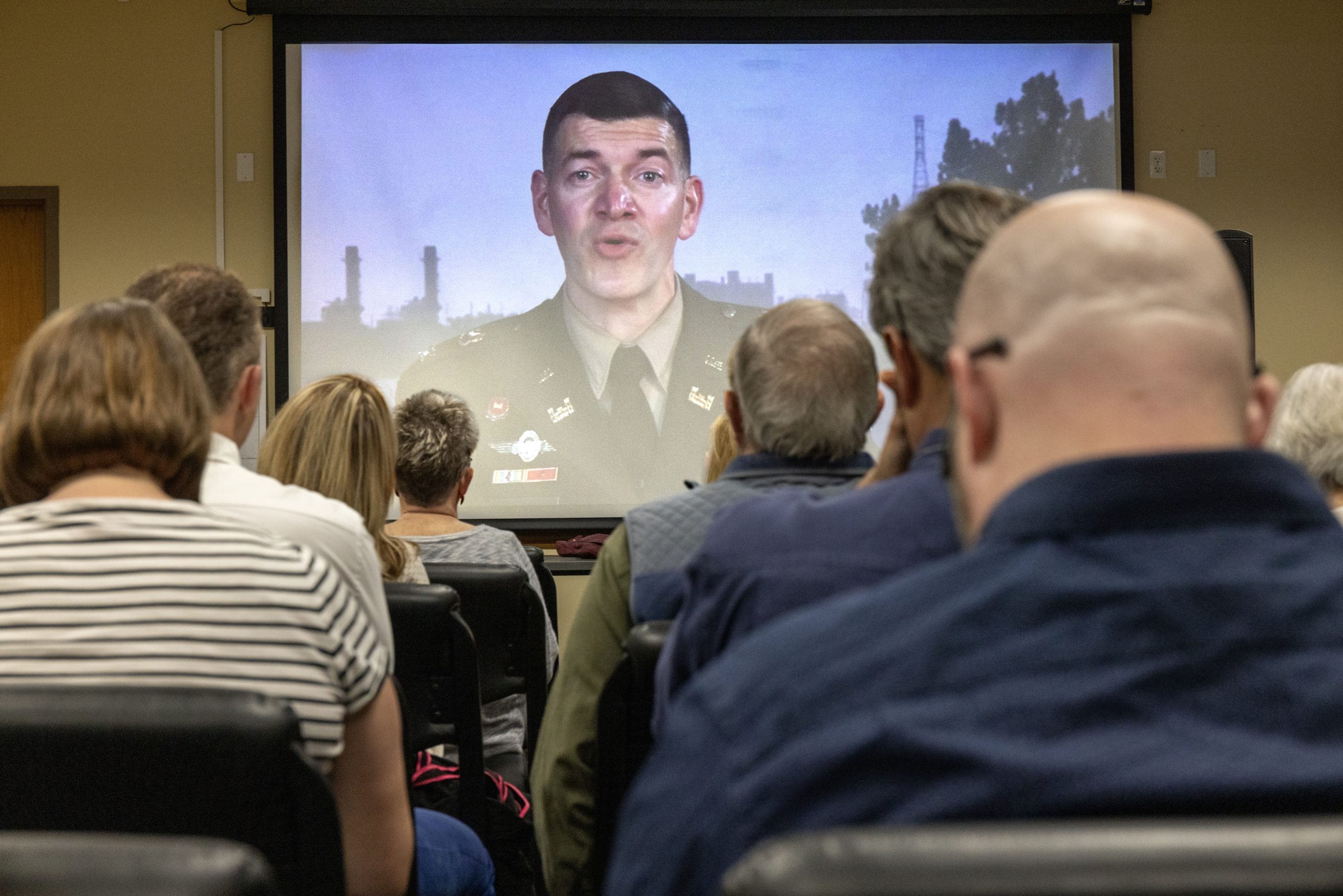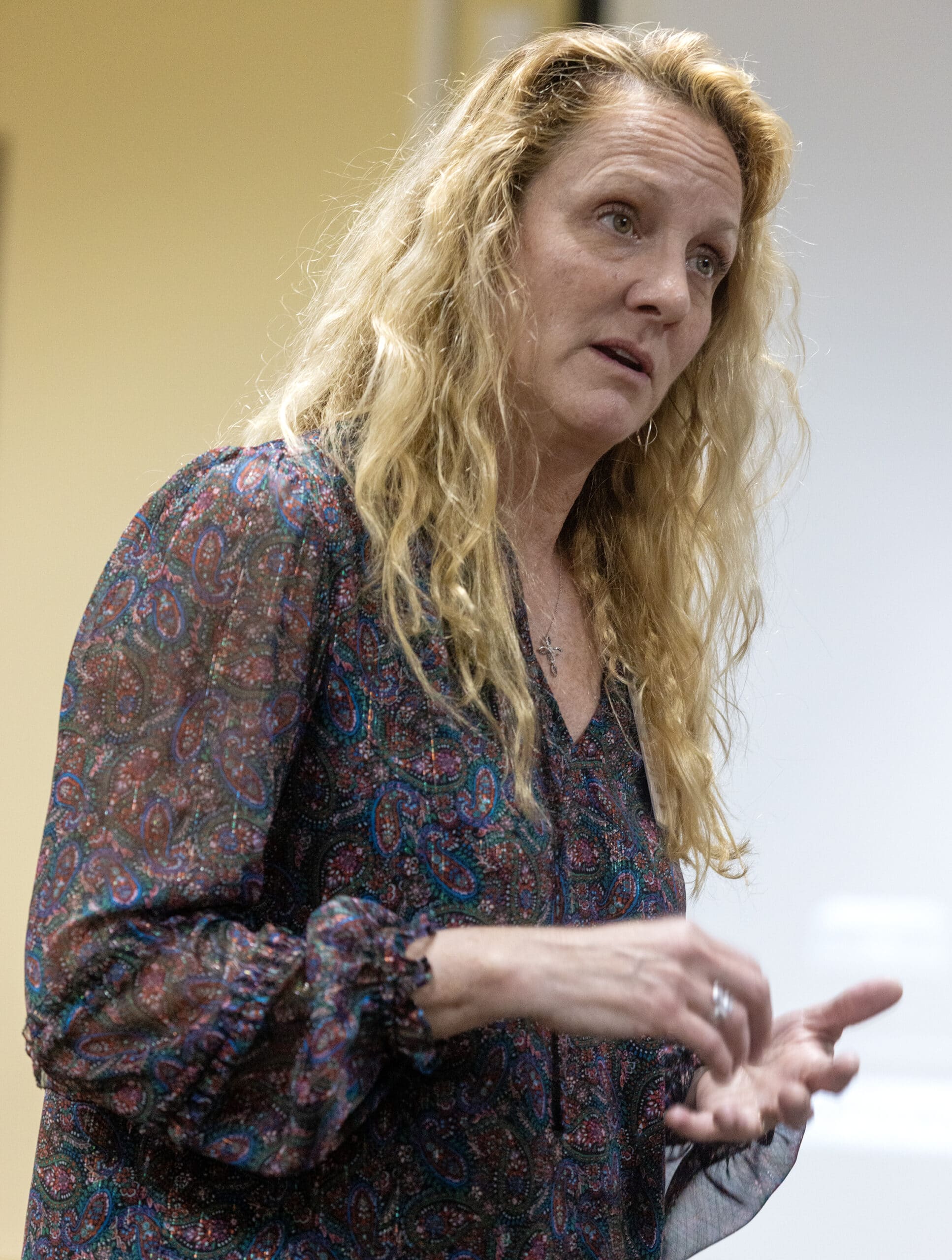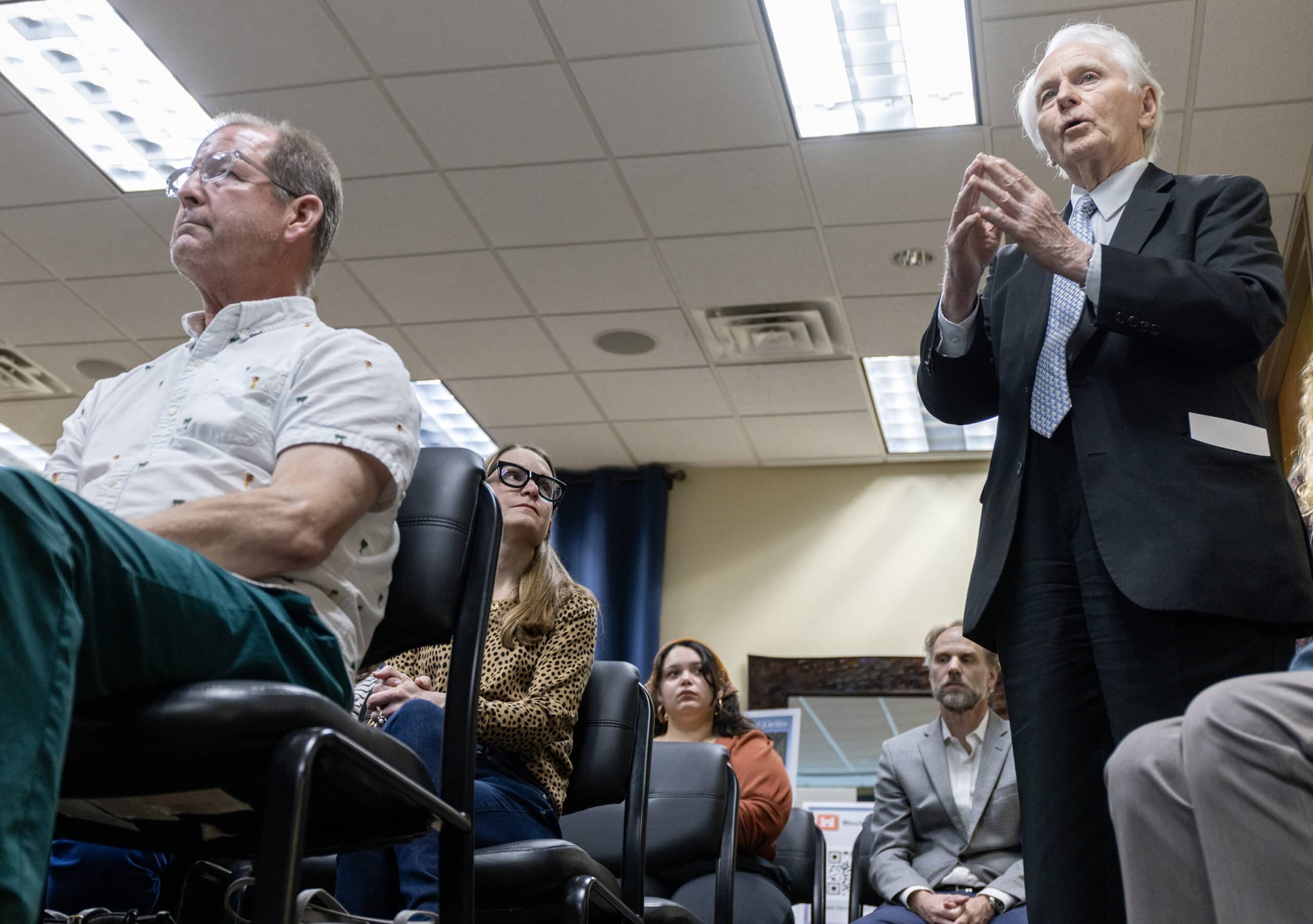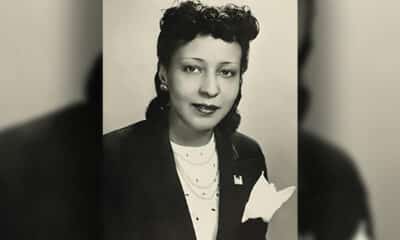Mississippi Today
Army Corps embarks on Lower Mississippi River ‘Mega Study,’ wants public input

BAY SAINT LOUIS — Mississippi Gulf Coast residents gathered at the Hancock County Library in Bay Saint Louis on Tuesday ready to voice their opposition over the use of the Bonnet Carré Spillway, which in recent years has plagued the Coast fisheries and the area’s overall economy.
But the public meeting, they learned, is part of a much broader effort by the U.S. Army Corps of Engineers to reevaluate how it manages the Lower Mississippi River, which stretches from Cape Girardeau, Missouri, to the Gulf of Mexico. The meeting on Tuesday was the first in a series the corps is holding over the next two weeks.
“It’s people, and it’s the environment, and it’s how do we balance all of our missions in this study considering the sediment and water budget in the Mississippi River, and how can we manage the overall study area in the best way possible for the next hundred years,” said Elizabeth Behrens, chief of the Environmental Studies Section for the corps’ New Orleans District.
Officially titled the Lower Mississippi River Comprehensive Management Study, the venture is a result of the Water Resources Development Act of 2020, and comes with $25 million of funding.

The goal of the study, which will be a five-year effort, is to recommend specific projects around flood control, floodplain management, navigation, environmental restoration, hydropower and recreation, among other purposes.
General project ideas that the corps is already considering include: balancing water and sediment throughout the river and tributary system, reconnecting the river to its floodplain in certain areas, stabilizing channels, reducing flood risk for disadvantaged areas and changing the use of existing structure.
In the first stage of the study, the corps is traveling to cities throughout the Lower Mississippi River plain to hear what ideas residents have. Additional Mississippi meetings will take place in Stoneville on Feb. 28, Natchez on Feb. 29, and Vicksburg on March. 11 (visit the corps’ study website for details on meeting details and how to submit feedback).
One of the existing structures that the corps may reevaluate is the Bonnet Carré Spillway, which the agency built in the late 1920s and early 1930s as part of the federal government’s response to the Great Flood of 1927. The spillway’s purpose is to divert incoming flood waters from New Orleans. When the Mississippi River reaches a certain height, the corps opens the Bonnet Carré, sending water into Lake Ponchartrain that eventually flows into the Mississippi Sound.
The corps has operated the spillway for roughly 90 years, but never as frequently as the last decade. In 2019, for the first time ever, the it opened the spillway twice in a calendar year.
The resulting influx of freshwater into the Mississippi Sound has historically disrupted the habitats of species such oysters, shrimp, crabs and even dolphins. The 2019 spillway openings devastated the populations of those species in the Sound, and subsequently local fisheries and the tourist-driven economy on the Coast as well.

Gerald Blessey, former mayor of Biloxi, said at Tuesday’s meeting that the corps needs to make changes to the spillway’s protocol before the end of the five-year study.
“We can expect more and more water (coming down the Mississippi River),” Blessey said. “There will be more floods. We can’t wait five years to start working on solutions.”
In response to the 2019 openings, Blessey and other Coast leaders organized the Mississippi Sound Coalition to call attention to the issue. Last month, the Coalition filed a lawsuit against the corps, alleging the agency violated the Marine Mammal Protection Act by lowering the salinity and causing “direct and indirect mortality of many resident bottleneck dolphins.”
On Wednesday, a Mississippi state Senate committee passed the “Mississippi Comprehensive Coastal Conservation and Restoration Act of 2024,” a bill that would create an advisory board to work with state agencies in restoring coastal habitats.
The corps will take input on its new Mississippi River study from the public until April 2.
Behrens, the corps staffer, said the study is a historic effort in developing how the federal government manages the Mississippi River.
“This is really unprecedented,” she said. “We’ve been operating on the river since the (1920s), and we’ve been operating it off of a consistent program for a while, so this is a monumental effort. A lot of people who are no longer even living looked forward to the day that we would look again at the Mississippi River and balancing it for all these missions.”
This article first appeared on Mississippi Today and is republished here under a Creative Commons license.![]()
Mississippi Today
On this day in 1951, Ruby Hurley opened NAACP office in South
April 28, 1951

Ruby Hurley opened the first permanent office of the NAACP in the South.
Her introduction to civil rights activism began when she helped organize Marian Anderson’s 1939 concert at the Lincoln Memorial. Four years later, she became national youth secretary for the NAACP. In 1951, she opened the organization’s office in Birmingham to grow memberships in Alabama, Florida, Georgia, Mississippi and Tennessee.
When she arrived in Mississippi, there were only 800 NAACP members. After the governor made remarks she disagreed with, she wrote a letter to the editor that was published in a Mississippi newspaper. After that step in courage, membership grew to 4,000.
“They were surprised and glad to find someone to challenge the governor,” she told the Chicago Defender. “No Negro had ever challenged the governor before.”
She helped Medgar Evers investigate the 1955 murder of Emmett Till and other violence against Black Americans. Despite threats, she pushed on.
“When you’re in the middle of these situations, there’s no room for fear,” she said. “If you have fear in your heart or mind, you can’t do a good job.”
After an all-white jury acquitted Till’s killers, she appeared on the front cover of Jet magazine with the headline, “Most Militant Negro Woman in the South.”
Months later, she helped Autherine Lucy become the first Black student at the University of Alabama.
For her work, she received many threats, including a bombing attempt on her home. She opened an NAACP office in Atlanta, where she served as a mentor for civil rights leader Vernon Jordan, with whom she worked extensively and who went on to serve as an adviser to President Bill Clinton.
After learning of Evers’ assassination in 1963, she became overwhelmed with sorrow. “I cried for three hours,” she said. “I shall always remember that pool of blood in which he lay and that spattered blood over the car where he tried to drag himself into the house.”
She died two years after retiring from the NAACP in 1978, and the U.S. Post Office recognized her work in the Civil Rights Pioneers stamp series. In 2022, she was portrayed in the ABC miniseries, “Women of the Movement.”
This article first appeared on Mississippi Today and is republished here under a Creative Commons Attribution-NoDerivatives 4.0 International License.![]()
Note: The following A.I. based commentary is not part of the original article, reproduced above, but is offered in the hopes that it will promote greater media literacy and critical thinking, by making any potential bias more visible to the reader –Staff Editor.
Political Bias Rating: Centrist
This content is primarily focused on the historical and personal achievements of Ruby Hurley, a civil rights activist. It emphasizes her dedication and bravery in challenging oppressive systems and advocating for racial justice. The narrative does not appear to endorse or criticize any contemporary political positions but highlights Hurley’s work with the NAACP and her role in significant civil rights events. While it mentions her opposition to certain government figures and the threat she faced, the tone is largely factual and centered on her contributions to history, which supports a centrist position without leaning toward a particular ideological side.
Mississippi Today
Derrick Simmons: Monday’s Confederate Memorial Day recognition is awful for Mississippians
Editor’s note: This essay is part of Mississippi Today Ideas, a platform for thoughtful Mississippians to share fact-based ideas about our state’s past, present and future. You can read more about the section here.
Each year, in a handful of states, public offices close, flags are lowered and official ceremonies commemorate “Confederate Memorial Day.”
Mississippi is among those handful of states that on Monday will celebrate the holiday intended to honor the soldiers who fought for the Confederacy during the Civil War.
But let me be clear: celebrating Confederate Memorial Day is not only racist but is bad policy, bad governance and a deep stain on the values we claim to uphold today.
First, there is no separating the Confederacy from the defense of slavery and white supremacy. The Confederacy was not about “states’ rights” in the abstract; it was about the right to own human beings. Confederate leaders themselves made that clear.
Confederate Vice President Alexander Stephens declared in his infamous “Cornerstone Speech” that the Confederacy was founded upon “the great truth that the negro is not equal to the white man.” No amount of revisionist history can erase the fact that the Confederacy’s cause was fundamentally rooted in preserving racial subjugation.
To honor that cause with a state holiday is to glorify a rebellion against the United States fought to defend the indefensible. It is an insult to every citizen who believes in equality and freedom, and it is a cruel slap in the face to Black Americans, whose ancestors endured the horrors of slavery and generations of systemic discrimination that followed.
Beyond its moral bankruptcy, Confederate Memorial Day is simply bad public policy. Holidays are public statements of our values. They are moments when a state, through official sanction, tells its citizens: “This is what we believe is worthy of honor.” Keeping Confederate Memorial Day on the calendar sends a message that a government once committed to denying basic human rights should be celebrated.
That message is not just outdated — it is dangerous. It nurtures the roots of racism, fuels division and legitimizes extremist ideologies that threaten our democracy today.
Moreover, there are real economic and administrative costs to shutting down government offices for this purpose. In a time when states face budget constraints, workforce shortages and urgent civic challenges, it is absurd to prioritize paid time off to commemorate a failed and racist insurrection. Our taxpayer dollars should be used to advance justice, education, infrastructure and economic development — not to prop up a lost cause of hate.
If we truly believe in moving forward together as one people, we must stop clinging to symbols that represent treason, brutality and white supremacy. There is a legislative record that supports this move in a veto-proof majority changing the state Confederate flag in 2020. Taking Confederate Memorial Day off our official state holiday calendar is another necessary step toward a more inclusive and just society.
Mississippi had the largest population of enslaved individuals in 1865 and today has the highest percentage of Black residents in the United States. We should not honor the Confederacy or Confederate Memorial Day. We should replace it.
Replacing a racist holiday with one that celebrates emancipation underscores the state’s rich African American history and promotes a more inclusive understanding of its past. It would also align the state’s observances with national efforts to commemorate the end of slavery and the ongoing pursuit of equality.
I will continue my legislative efforts to replace Confederate Memorial Day as a state holiday with Juneteenth, which commemorates the freedom for America’s enslaved people.
It’s time to end Confederate Memorial Day once and for all.
Derrick T. Simmons, D-Greensville, serves as the minority leader in the state Senate. He represents Bolivar, Coahoma and Washington counties in the Mississippi Senate.
This article first appeared on Mississippi Today and is republished here under a Creative Commons Attribution-NoDerivatives 4.0 International License.
The post Derrick Simmons: Monday's Confederate Memorial Day recognition is awful for Mississippians appeared first on mississippitoday.org
Note: The following A.I. based commentary is not part of the original article, reproduced above, but is offered in the hopes that it will promote greater media literacy and critical thinking, by making any potential bias more visible to the reader –Staff Editor.
Political Bias Rating: Left-Leaning
This article argues against the celebration of Confederate Memorial Day, stating it glorifies a racist and failed rebellion that is harmful to societal values. It critiques the holiday as a symbol of white supremacy and advocates for replacing it with Juneteenth to honor emancipation. The language used, such as referring to the Confederate cause as “moral bankruptcy,” and the call to replace the holiday reflects a progressive stance on social justice and racial equality, common in left-leaning perspectives. Additionally, the writer urges action for inclusivity and justice, positioning the argument within modern liberal values.
Mississippi Today
On this day in 1903, W.E.B. Du Bois urged active resistance to racist policies
April 27, 1903

W.E.B. Du Bois, in his book, “The Souls of Black Folk,” called for active resistance to racist policies: “We have no right to sit silently by while the inevitable seeds are sown for a harvest of disaster to our children, black and white.”
He described the tension between being Black and being an American: “One ever feels his twoness, — an American, a Negro; two souls, two thoughts, two unreconciled strivings; two warring ideals in one dark body, whose strength alone keeps it from being torn asunder.”
He criticized Washington’s “Atlanta Compromise” speech. Six years later, Du Bois helped found the NAACP and became the editor of its monthly magazine, The Crisis. He waged protests against the racist silent film “The Birth of a Nation” and against lynchings of Black Americans, detailing the 2,732 lynchings between 1884 and 1914.
In 1921, he decried Harvard University’s decisions to ban Black students from the dormitories as an attempt to renew “the Anglo-Saxon cult, the worship of the Nordic totem, the disenfranchisement of Negro, Jew, Irishman, Italian, Hungarian, Asiatic and South Sea Islander — the world rule of Nordic white through brute force.”
In 1929, he debated Lothrop Stoddard, a proponent of scientific racism, who also happened to belong to the Ku Klux Klan. The Chicago Defender’s front page headline read, “5,000 Cheer W.E.B. DuBois, Laugh at Lothrup Stoddard.”
In 1949, the FBI began to investigate Du Bois as a “suspected Communist,” and he was indicted on trumped-up charges that he had acted as an agent of a foreign state and had failed to register. The government dropped the case after Albert Einstein volunteered to testify as a character witness.
Despite the lack of conviction, the government confiscated his passport for eight years. In 1960, he recovered his passport and traveled to the newly created Republic of Ghana. Three years later, the U.S. government refused to renew his passport, so Du Bois became a citizen of Ghana. He died on Aug. 27, 1963, the eve of the March on Washington.
This article first appeared on Mississippi Today and is republished here under a Creative Commons Attribution-NoDerivatives 4.0 International License.![]()
-

 SuperTalk FM6 days ago
SuperTalk FM6 days agoNew Amazon dock operations facility to bring 1,000 jobs to Marshall County
-

 News from the South - Missouri News Feed2 days ago
News from the South - Missouri News Feed2 days agoMissouri lawmakers on the cusp of legalizing housing discrimination
-

 News from the South - Alabama News Feed6 days ago
News from the South - Alabama News Feed6 days agoPrayer Vigil Held for Ronald Dumas Jr., Family Continues to Pray for His Return | April 21, 2025 | N
-

 News from the South - Florida News Feed6 days ago
News from the South - Florida News Feed6 days agoTrump touts manufacturing while undercutting state efforts to help factories
-

 News from the South - Florida News Feed6 days ago
News from the South - Florida News Feed6 days agoFederal report due on Lumbee Tribe of North Carolina’s path to recognition as a tribal nation
-

 News from the South - Virginia News Feed7 days ago
News from the South - Virginia News Feed7 days agoTaking video of military bases using drones could be outlawed | Virginia
-

 Mississippi Today4 days ago
Mississippi Today4 days agoStruggling water, sewer systems impose ‘astronomic’ rate hikes
-

 News from the South - Oklahoma News Feed6 days ago
News from the South - Oklahoma News Feed6 days agoOklahoma Treasurer’s Office Faces Scrutiny Over Use of Signal in Anti-ESG Coordination














































